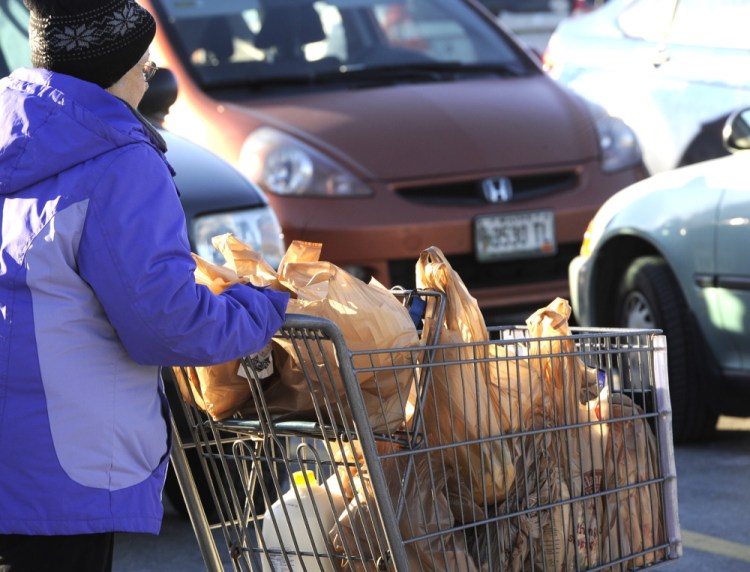Waterville might join the ranks of cities and towns across the state placing restrictions on single-use plastic bags.
Leading the effort to regulate bags are members of the Sustain Mid Maine Coalition, who met Tuesday afternoon for the first time. Linda Woods, coordinator of the organization, said they wanted to find out if regulating the bags could work in Waterville. Though the group did not come with definite plans, the members indicated they were interested in a potential fee on the bags.
Stu Silverstein, a member of the city’s solid waste committee, said for years he’s been carrying his own bags to grocery stores, calling it “the right thing to do.” Reusable plastic bags can carry more items, he said, whereas plastic bags from the store can gum up recycling operations when they do make it to a recycling center.
“We can do something about it,” he said.
Ryan Parker, environmental policy outreach coordinator for the Natural Resources Council of Maine, said nine communities around the state have imposed some kind of regulation on bags. Saco is the latest, choosing to ban single-use plastic bags, becoming the fifth community in Maine to do so.
Other municipalities, including Portland and South Portland, have adopted fees for single-use plastic and paper bags. Several have opted for a 5-cent fee on bags. Some impose restrictions on bags where food is sold. For example, Portland’s restrictions apply to stores where more than 2 percent of sales are food sales, while Saco’s restrictions apply to any business that had to file a permit with the city.
Silverstein said he was in favor of a modest fee on single-use bags, as a fee would discourage shoppers from using those bags. Single-use bags often are considered to be the plastic shopping bags from grocery stores. While the group largely agreed a fee would be preferred over an outright ban on plastic bags, they were not sure if paper bags should be included as well.
Single-use plastic bags are cited frequently as environmental hazards that find their way into waterways and harm animal life or end up as litter in trees and on city streets. Silverstein said the plastic bags are not biodegradable, and while he wanted to take action, he didn’t want to impose a ban on residents.
“We should leave people with a choice,” he said.
Woods said the committee has yet to form an official opinion on whether to try for a ban or a fee.
Parker, who was invited to speak to the coalition, said the committee will need to figure out what the scope of its work will be. For example, they’ll need to define what a single-use bag is. Falmouth’s ordinance defines a single-use plastic bag as being 4 millimeters thick and prevents retailers from selling thinner bags as reusable. Portland’s ordinance allows the standard 2.25-millimeter thickness.
Toby Rose, store manager at Save-A-Lot on The Concourse, said his store already has a 3-cent fee on single-use bags. Since customers have to buy bags at the store, he’s noticed they are more inclined to buy bags that can be reused rather than the single-use ones.
“People would rather bring bags than pay 3 cents,” Rose said.
Parker said the 3-cent fee can deter use of single-use bags. When Rose mentioned he was curious about a fee on paper bags as well as plastic, Parker said he prefers not to make customers choose one bag over the other. Instead, the approach should be to encourage customers to get reusable bags.
“The simpler the better,” he said.
Once a community does impose some kind of restriction, Parker said, the measures tend to spread to neighboring communities. Committee members said they hoped that would happen in the Waterville area, noting that Waterville could use the lessons learned in places such as Portland.
“We have the Portland ordinance already written,” Silverstein said. “It’s right there in front of us.”
The committee is scheduled to meet again Aug. 15. Woods asked the group between now and then to look at different ordinances to discuss positives and negatives, but to focus on the Portland ordinance. After that, they’ll refine what they want a Waterville ordinance to look like.
Parker advised the group to look at what worked in other communities to see what might pass in Waterville.
City Council Chairman Steve Soule invited the committee members to come before the council to let it know they’re working on the bag issue. He also said they should look into conducting a survey of residents.
Parker said members should start talking to local businesses to see how an ordinance might affect them and their businesses, but committee members seemed more inclined to wait until they had a draft of the ordinance ready.
While there is no timeline set going forward, Parker warned the committee that it probably will take longer than they expect to develop a finished ordinance.
Colin Ellis — 861-9253
cellis@centralmaine.com
Twitter: @colinoellis
Send questions/comments to the editors.




Success. Please wait for the page to reload. If the page does not reload within 5 seconds, please refresh the page.
Enter your email and password to access comments.
Hi, to comment on stories you must . This profile is in addition to your subscription and website login.
Already have a commenting profile? .
Invalid username/password.
Please check your email to confirm and complete your registration.
Only subscribers are eligible to post comments. Please subscribe or login first for digital access. Here’s why.
Use the form below to reset your password. When you've submitted your account email, we will send an email with a reset code.